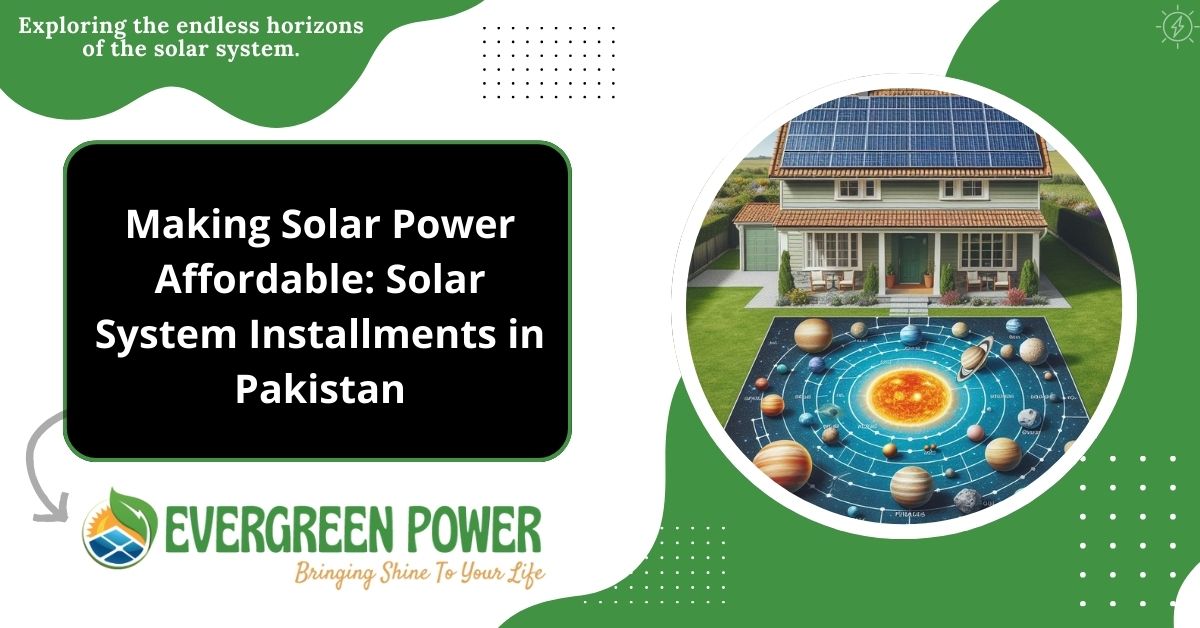Unlock the power of Solar System Installments in Pakistan. Learn about eligibility, benefits, and factors before choosing a solar system installment plan. Take control of your energy future today!
Introduction
Overview:
The burgeoning interest in solar energy in Pakistan stems from the nation’s quest for energy security, coupled with the need to mitigate the adverse effects of traditional fossil fuel-based power generation on the environment. As the population grows and urbanization expands, the demand for electricity continues to rise, placing strain on the existing grid infrastructure and exacerbating issues such as load shedding and power outages.

Introduction:
In response to the growing demand for sustainable energy solutions, the concept of purchasing solar systems in installments has emerged as a pragmatic approach to democratizing access to solar power technology. This model allows individuals and businesses to overcome the barrier of high upfront costs associated with Solar System installation on installment in Pakistan and enables them to transition to clean enesources that arerces more affordable.
Importance:
Access to affordable solar energy is not merely a matter of convenience; it’s fundamental to fostering economic development, reducing carbon emissions, and ensuring energy independence for Pakistan’s populace. By harnessing the abundant solar resources available in the region and leveraging innovative financing mechanisms, Pakistan can transform its energy landscape and pave the way for a more sustainable future.
Understanding Solar Power
Solar energy works by utilizing photovoltaic panels to convert sunlight into electricity. This electricity can then be used to power homes, businesses, and even entire communities, providing a clean and renewable source of energy. Photovoltaic cells, made of semiconductor materials such as silicon, generate direct current (DC) electricity when exposed to sunlight. This DC electricity is converted into alternating current (AC) electricity using inverters, making it compatible with the existing electrical grid.
Advantages:
Beyond its environmental benefits, solar power offers numerous advantages, including lower long-term energy costs, reduced reliance on finite fossil fuels, and increased energy independence. Solar energy systems require minimal maintenance and have a lifespan of 25 years or more, making them a reliable and cost-effective investment for both residential and commercial applications.
Potential Cost Savings:
While the initial investment in solar panels may seem daunting, the long-term savings on electricity bills and potential revenue from excess energy production can make solar power a financially prudent choice for individuals and businesses alike. By generating their electricity onsite, consumers can reduce or even eliminate their dependence on the grid, thereby shielding themselves from rising energy priceTheocurrent scenariouel markets.
The current scenario of Solar Energy in Pakistan
Overview:
Despite abundant solar resources, the adoption of solar energy in Pakistan faces several challenges, including high upfront costs, limited financing options, and inadequate infrastructure for grid integration. The government has taken steps to promote solar energy through various initiatives, including net metering policies, tax incentives, and subsidies for solar installations. However, progress has been slow due to bureaucratic hurdles, inconsistent policies, and a lack of public awareness about the benefits of solar energy.
Challenges:
Factors such as bureaucratic red tape, inconsistent government policies, and a lack of public awareness about the benefits of solar energy have hindered its widespread adoption in Pakistan. Additionally, the intermittent nature of solar power poses challenges to grid stability and reliability, requiring investment in energy storage and smart grid technologies to mitigate potential issues.

Need for Innovation:
To overcome these challenges, innovative solutions are required, including the development of affordable financing mechanisms like installment plans, as well as initiatives to educate and incentivize consumers to embrace solar energy. By streamlining the process of installing and financing solar energy systems, Pakistan can unlock the full potential of its solar resources and accelerate the transition to a clean and sustainable energy future.
Solar System Installments: How Does It Work?
Solar system installments entail breaking down the total cost of purchasing and installing a solar energy system into manageable monthly payments over a predefined period, typically ranging from a few years to a decade. This allows consumers to spread out the upfront costs of solar installation and make the transition to clean energy more affordable.
Key Features:
Installment plans often include comprehensive services such as system design, installation, maintenance, and warranties, providing consumers with peace of mind and ensuring the longevity and efficiency of their solar investment. Some installment plans may also offer flexible repayment options, allowing consumers to adjust their payments based on their energy usage and financial situation.
Examples:
Companies specializing in renewable energy solutions in Pakistan, such as Solar Solutions Ltd. and Green Energy Innovations, offer tailored installment plans that cater to the diverse needs and budgets of residential, commercial, and industrial customers. These companies work closely with customers to design custom solar solutions based on their energy needs, available space, and budget constraints, ensuring a seamless transition to solar power.
Advantages of Purchasing Solar Systems on Installments
Affordability:
By spreading the cost of solar system ownership over time, installment plans make solar power accessible to a broader segment of the population, including low- and middle-income households. This enables consumers to reap the benefits of solar energy without having to make a significant upfront investment, making it a more attractive option for those with limited financial resources.
Accessibility:
Installment plans eliminate the need for large upfront investments, removing a significant barrier to entry for consumers who may otherwise be unable to afford solar energy systems. This democratization of access to solar power ensures that all segments of society, regardless of income level or geographical location, can participate in the transition to clean energy and contribute to the fight against climate change.
Ownership:
Unlike leasing or renting, purchasing a solar energy system through installments grants consumers full ownership and control over their energy production, allowing them to maximize their savings and environmental impact over the system’s lifespan. By owning their solar panels, consumers can also take advantage of government incentives, such as net metering and feed-in tariffs, to further reduce their energy costs and generate additional revenue from excess energy production.
Considerations Before Opting for Solar System Installments
Assessment:
Conducting a thorough assessment of energy needs, consumption patterns, and available solar resources is essential to determine the appropriate size and configuration of a solar energy system. Factors such as the orientation and tilt of the roof, shading from nearby trees or buildings, and local weather patterns can impact the performance and efficiency of solar panels, so it’s important to assess these factors before investing in solar energy.
Evaluation:
Before committing to an installment plan, consumers should carefully review the terms, conditions, and interest rates offered by different providers to ensure they are getting the best possible deal for their investment. It’s also important to consider the reputation and track record of the solar installer, as well as the quality and reliability of the solar panels and other components being used in the installation.
Maintenance:
While many installment plans include maintenance services and warranties, consumers should be aware of their responsibilities for routine upkeep and any potential costs associated with repairs or replacements. Regular maintenance, such as cleaning the solar panels and inspecting the system for signs of damage or wear, can help ensure optimal performance and prolong the lifespan of the solar energy system.
Case Studies: Success Stories of Solar System Installments in Pakistan
Real-Life Examples:
Highlighting individuals, businesses, and communities that have successfully transitioned to solar power through installment plans, showcasing the tangible benefits in terms of energy savings, reliability, and environmental impact. For example, a rural village in Punjab province may have installed a solar microgrid through an installment plan, providing reliable electricity to homes, schools, and businesses for the first time.
Impact:
Sharing data and testimonials illustrating the positive effects of solar energy adoption on reducing electricity bills, improving energy resilience, and lowering carbon emissions in Pakistan. By quantifying the economic and environmental benefits of solar power, case studies can help convince skeptics and inspire others to make the switch to clean energy.
Benefits:
Emphasizing the broader socioeconomic and environmental benefits of widespread solar energy adoption, including job creation, local economic development, and reduced air pollution. Solar energy has the potential to transform communities by providing clean, reliable electricity, creating local jobs in installation and maintenance, and reducing reliance on imported fossil fuels, thereby improving energy security and contributing to sustainable development goals.
Future Outlook and Recommendations
Potential Growth:
With supportive government policies, technological advancements, and increasing consumer awareness, the solar energy market in Pakistan is poised for exponential growth in the coming years. The declining cost of solar panels, coupled with improvements in energy storage and grid integration technologies, will further enhance the competitiveness and attractiveness of solar power as a viable alternative to traditional fossil fuels.
Recommendations:
Policymakers, industry stakeholders, and civil society organizations must collaborate to develop and implement policies that incentivize solar energy adoption, expand access to financing, and improve the regulatory environment for renewable energy investments. This may include extending tax credits and subsidies for solar installations, streamlining permitting processes, and establishing clear guidelines for net metering and feed-in tariffs to encourage investment in solar energy infrastructure.

FAQ’s
How does the installment plan for solar systems work in Pakistan?
Installment plans for solar systems in Pakistan typically involve spreading out the cost of the system over a while, allowing customers to make payments in manageable installments instead of paying the full amount upfront. Customers can choose from various installment options offered by solar companies or financial institutions.
What are the benefits of opting for a solar system in installments in Pakistan?
Opting for a solar system in installments in Pakistan offers several benefits. Firstly, it allows individuals or businesses to harness solar energy without facing the financial burden of a large upfront payment. Additionally, it enables them to enjoy immediate savings on their electricity bills while contributing to a cleaner environment by reducing reliance on fossil fuels.
Are there any eligibility criteria for availing solar system installment plans in Pakistan?
Eligibility criteria for availing solar system installment plans may vary depending on the provider. However, individuals typically need to meet certain requirements such as having a valid national identification card, a stable source of income, and a good credit history. Some providers may also require proof of property ownership or a guarantor.
What factors should I consider before choosing a solar system installment plan in Pakistan?
Before choosing a solar system installment plan, it’s essential to consider factors such as the total cost of the system, the duration of the installment period, the interest rate (if applicable), and the reputation of the provider. It’s also advisable to assess your energy needs and determine the size and type of solar system that best suit your requirements.
Can I upgrade or modify my solar system if I opt for an installment plan in Pakistan?
Yes, many providers offer flexibility for customers tsystems,de or modify their solar systems even if they’re on an installment plan. However, it’s important to check the terms and conditions of the installment agreement to understand any associated costs or procedures for making changes to the system.
What happens if I fail to make payments on time for my solar system installment plan in Pakistan?
Failing to make payments on time for a solar system installment plan can have consequences such as late payment fees, penalties, or even termination of the agreement, depending on the terms set by the provider. It’s crucial to you’re havingicate h the provider if facing difficulties in making payments to explore possible solutions or arrangements.
Conclusion:
Solar system installments have the potential to play a pivotal role in accelerating Pakistan’s transition to a sustainable and resilient energy future, driving economic growth, enhancing energy security, and safeguarding the environment for future generations. By making solar power affordable and accessible to all segments of society, Pakistan can reduce its reliance on fossil fuels, mitigate the impacts of climate change, and create a cleaner, healthier environment for its citizens.

